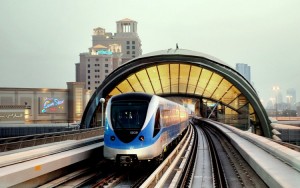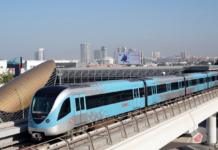By Shoba Narayan www.thenational.ae
There have been two distinct reactions from my friends in Dubai about the announcement that the Metro’s Green Line will open next August. One group, comprised of students, artists, environmentalists and mostly working class folks, is upset that they will have to wait so long. The other couldn’t care less.
 “I have never ridden the Metro; I don’t plan on doing so; and I don’t know anyone that does,” is the attitude of this wealthy subset, who live in palatial homes and have made good from the UAE’s prosperity. “What would my driver do if I rode the Metro?” asked my friend, Ria, whose husband heads a multinational. “And what would I do on the Metro?”
“I have never ridden the Metro; I don’t plan on doing so; and I don’t know anyone that does,” is the attitude of this wealthy subset, who live in palatial homes and have made good from the UAE’s prosperity. “What would my driver do if I rode the Metro?” asked my friend, Ria, whose husband heads a multinational. “And what would I do on the Metro?”
@body arnhem:I have three words for her: be a flaneur. As the essayist Alain de Botton says, flaneurs stand in deliberate opposition to the two imperatives of modern society: to be in a hurry and to buy things. Flaneurs do neither. They stroll and saunter; eavesdrop on conversations; watch people, wonder who they might be, and construct narratives about their lives. All this is possible on a train. Even better, your environs are air-conditioned and spanking clean. The Metro provides a convivial, civilised way to be a flaneur.
In France, where the word originated, flaneurs can walk the streets and open their eyes and ears to the scenes around them. In tropical countries, we have to make do with air-conditioned public places such as malls and metros.
It was the French poet Charles Baudelaire who came up with the word “flaneur” to describe the attitude that he thought we should adopt while walking the streets. While the closest English translation would be stroller or saunterer, flaneur has a particular Gallic connotation.
It is easy to imagine a louche French dandy sauntering up the Champs Elysees in a tight overcoat and red socks, eyeing the women walking by and enjoying the drama of the streets. Americans are in too much of a hurry to do this; British are too polite or apathetic to stare.
Indians and Arabs are born flaneurs. We saunter and stare. We take stock and measure the value of things and people. Our grannies have all the time in the world to observe, imagine and gossip. Even if we have no intention of buying, we like to go into a store just to look. Our public places encompass rather than intimidate.
Naturally, most people still commute by car or car-pool – 91 per cent, according to surveys – even if they complain about the stress of driving a cumulative three hours every day. But it is a chicken and egg situation. Until more people ride the train, the government won’t have a legitimate reason to invest in its expansion.
Having a functioning public transport system is the mark of a great city and with the Metro, Dubai has taken an important step. In surveys of the world’s most liveable cities, Zurich, Copenhagen and Munich rank highly, in no small part because of their superb metro systems.
No Middle Eastern or Asian city, save Singapore and Tokyo, even features on most of these lists but a functioning Metro will allow Dubai to make the cut.
After all, trains are more egalitarian than buses or trams. One of the pleasures of riding the New York subway in the 1990s was the unexpected sight of John F Kennedy Jr elbowing his way into your car.
Great cities of the world engender people’s hopes and aspirations. To plunge into Piccadilly, Fifth Avenue, Boulevard Saint-Germain, or Paradeplatz is to feel part of a great and variegated group of beings who are both similar to us and intensely different.
Being in a public place is an exercise in subsuming the ego for the pleasures of being a part of the great tide of humanity. Sitting together on a subway allows people of different classes to mix and even decompress together. Soon, commuters will start talking, sharing stories and chores.
Now Abu Dhabi is learning from Dubai’s experience and is planning its own metro system. But first we need the Dubai Metro to be fully open and functioning to know how it should be built.
The government ought to open the remaining stations, and soon. Concerned citizens, meanwhile, ought to spread the word and encourage their friends to ride the Metro. “Meet me on the train,” you might say. Why ever should we not?
Shoba Narayan is a Bangalore-based writer and author of Monsoon Diary: a Memoir with Recipes.

















